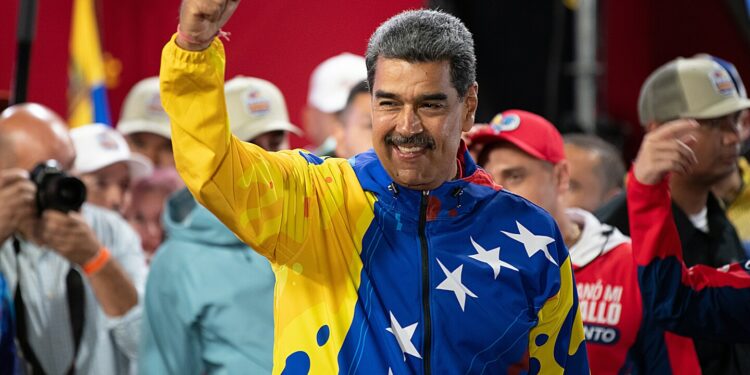What is the significance of the international community’s response to the election results for Venezuela and its people?
Global Leaders Question Validity of Venezuela Election Results and Maduro’s Victory Claim
The recent presidential election in Venezuela has caused quite a stir in the international community, with many global leaders openly questioning the validity of the election results and President Nicolás Maduro’s claim of victory. The controversial election has sparked widespread concern about the transparency and fairness of the electoral process in Venezuela, as well as the state of democracy in the country.
The election, which took place on May 20, 2018, saw Maduro re-elected for a second six-year term amid allegations of widespread irregularities and voter intimidation. The main opposition parties were barred from participating, and the election was marred by reports of voter coercion and discrepancies in the vote counting process. As a result, several countries, including the United States and members of the European Union, have refused to recognize the results of the election, deeming it undemocratic and illegitimate.
Key Leaders’ Reactions
Numerous global leaders have voiced their concerns about the validity of the election results and Maduro’s claim of victory. Some of the most notable reactions include:
United States: The U.S. government issued a statement expressing its refusal to recognize the election results, citing the lack of free and fair competition and credible international observation. President Donald Trump also signed an executive order imposing further sanctions on Venezuela.
European Union: The European Union also criticized the election, stating that it did not meet international standards for a credible process, and that it had called for new presidential elections in Venezuela.
Organization of American States (OAS): The OAS passed a resolution not to recognize the legitimacy of the election, emphasizing the need for new, free, and fair elections with international observers.
Lima Group: This coalition of Latin American countries, including Argentina, Brazil, Canada, Colombia, and several others, condemned the Venezuelan election and called for the formation of a group of countries and organizations to support a peaceful and democratic solution to the crisis in Venezuela.
What’s at Stake?
The outcome of the election and the ensuing international reaction have significant implications for Venezuela and the region as a whole. The ongoing political and economic crisis in Venezuela has led to widespread food shortages, hyperinflation, and a mass exodus of citizens seeking refuge in neighboring countries. The international community’s response to the election results will undoubtedly shape the direction of Venezuela’s future and affect the lives of millions of people.
The refusal of several countries to recognize the legitimacy of the election and the imposition of sanctions on Venezuela could further isolate the country and exacerbate its economic and humanitarian crisis. On the other hand, Maduro’s government has dismissed the international criticism as interference in Venezuela’s internal affairs and has vowed to continue its socialist policies despite the external pressure.
Moving Forward
In light of the controversy surrounding the election, there is a pressing need for a peaceful and democratic resolution to the crisis in Venezuela. The international community’s stance on the election has highlighted the importance of upholding democratic principles and human rights, as well as the need for a transparent and inclusive electoral process.
While the future of Venezuela remains uncertain, it is clear that the situation is far from resolved. The global scrutiny of the election results and Maduro’s victory claim underscores the broader implications of the crisis for the region and the world at large. The coming months will be crucial in determining the path forward for Venezuela and its people.
the widespread questioning of the validity of Venezuela’s election results and President Maduro’s claim of victory has drawn global attention to the crisis in the country. The refusal of several countries to recognize the election has significant implications for the future of Venezuela and its people. The international community’s response will undoubtedly shape the trajectory of the crisis and the broader implications for the region and the world. The ongoing developments in Venezuela warrant close scrutiny and continued efforts to support a peaceful and democratic solution to the crisis.
Table: Global Leaders’ Reactions to Venezuela Election
| Country | Reaction |
|---|---|
| United States | Refusal to recognize election results |
| European Union | Criticism of lack of credible electoral process |
| Organization of American States (OAS) | Passed resolution not recognizing the legitimacy of the election |
| Lima Group | Condemnation of the election and call for new elections |
It was revealed on Monday that the results of the election Venezuela’s presidential election have come under scrutiny by both the United States and several Latin American countries. The Venezuelan elections officials declared President Nicolás Maduro’s victory in the election, but there are doubts about the accuracy of these claims by several countries. Among those who are skeptical is Celso Amorim, a top foreign policy adviser for Brazilian President Luiz Inácio Lula da Silva, who is not recognizing the election results as legitimate.
Amorim, a key ally to Maduro, is urging for transparency in the vote-counting process. He and other foreign leaders are demanding that the Maduro government publish precinct-level voting records to provide evidence of their claims. There is a refusal to endorse any narrative that there was fraud until concrete evidence is provided.
Venezuela’s National Electoral Council, controlled by Maduro, claimed that he won 51 percent of the vote to opposition candidate Edmundo González’s 44 percent. However, this has been met with skepticism as independent exit polling and partial results suggested González captivated twice as many votes as Maduro.
In the midst of this turmoil, Venezuelan opposition, saw the election as an incredible opportunity to defeat the authoritarian socialist rule. They have demanded that Maduro hand over scanned printouts of all voting records, which total more than 30,000 documents, for thorough scrutiny. The opposition sees the election results as undeniably fraudulent and an attempt to silence the voice of the Venezuelan people.
The United States has joined in the call for transparency, with the U.S. National Security Council spokesman John Kirby urging Maduro to publish the full, detailed tabulation of votes. There is skepticism about the credibility of the election results, and the U.S. is holding off from making any judgment until the necessary information is released.
Furthermore, the administration officials have verified that the Maduro government has all the voting data available and should immediately release it. They have received information showing that the results are at odds with actual voter turnout, potentially substantially so. The United States is considering further steps and evaluating its sanctions policy.
This situation is not unique in Venezuela, as just three years ago, Maduro claimed reelection in a vote marred by irregularities, prompting mass protests at home and condemnation abroad. The United States and other countries ultimately declared Maduro illegitimate and recognized Juan Guaidó as Venezuela’s rightful leader. The U.S. is expected to use the same caution and assess the situation thoroughly before making any decisions.
The Venezuelan Attorney General has accused opposition leaders of manipulating election data, signaling an atmosphere of heightened tension and controversy surrounding the election.
The reported results of the election have drawn skepticism from Latin American leaders across the political spectrum, calling for independent verification of the vote count and international observers to be given full access to the results. On the other hand, allies of Maduro, such as Russia, China, Iran, and Cuba, have congratulated him on his victory.
The election has further deepened the political divide in Venezuela and raised concerns about the questionable legitimacy and transparency of the electoral process. The international community is closely monitoring the situation and waiting for further evidence to confirm the credibility of the results.





